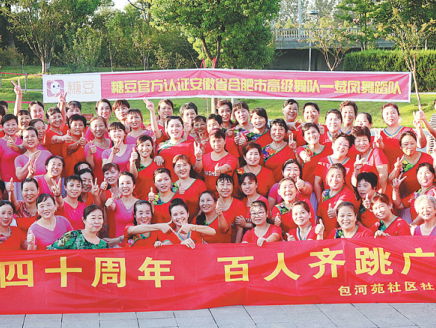Smartphone app caters to needs of dancing aunties
By OUYANG SHIJIA | China Daily | Updated: 2019-01-15 07:21

You might have watched Chinese dancing aunties rule the streets, parks and plazas across the country, waving hands to the blaring of catchy pop and folk music. But have you ever noticed these dances are now being fueled by technologies?
That's exactly the latest booming trend among the middle-aged and elderly dancing communities in China.
An estimated 80 million to 100 million Chinese-mainly middle-aged and senior females-are now embracing the square dance, which offers a convenient way for social networking and exercise, said a report by Economist Corporate Network. And those dancing aunties' enthusiasm reportedly will create a market worth more than 1 trillion yuan ($146 billion) in the near future.
"The phenomenon of plaza dance aerobics is notable for its ability to induce a usually sedentary, older component of China's population to regularly exercise," the corporate noted in the report.
The report said public dancing has proven a hit with businesses and investors too, as plaza dancers need athletic wear and shoes, access to trending music and tutorials as well.
Beijing-based Tangdou Square Dance is one of the many apps that serve as digital platforms for the plaza dancing community.
The app particularly caters to those middle-aged and elderly dancing aunties living a more leisurely life and liking dancing in plazas and public places during their spare time. Its offerings feature streaming videos of the latest dancing styles and music, funny life stories, as well as entertainment news and articles.
Zhang Yuan, founder and CEO of Tangdou, said instead of touted as kind of a subculture in the internet age, the increasingly growing tech-savvy dancing aunties will create a positive strong culture in the future.
"With the increasing number of silver-haired generation and the aging trend in China, we aim to build an entertainment community platform through providing high-quality content and services, creating a spiritual home to help more seniors live well and gracefully," Zhang said.

Statistics from mobile app tracker Analysys Qianfan shows that the Tangdou app had gained more than 8 million active users by November 2018, up by 1.6 percent on the previous month.
Notably, the data shows only 10 percent of Tangdou app's users are from super first-tier cities like Beijing and Shanghai. Users from first-tier, second-tier and third-tier cities account for 31 percent, 22 percent and 25 percent respectively.
"Middle-aged and elderly people living in big cities usually have abundant public services to enjoy, such as going to a community colleges to socialize and learn some musical instruments. While those living in small and medium-sized cities really need entertainment services," Zhang noted.
Seeing the growing trend of middle-aged and elderly people embracing WeChat's mini programs for entertainment search, Tangdou has unveiled its own mini programs to reach more senior users, especially those who don't usually download mobile apps.
It also offers services via smart televisions to cover more scenarios in their daily life.
So far, Tangdou claims it has attained more than 200 million middle-aged and elderly users across all channels, of which more than half are aged above 40. Tangdou has gained more than $25 million investment.
"The key challenges for the evolving square dancing sector are ensuring top quality of services and the ability to scale up," Xue Yongfeng, a senior analyst at Beijing-based consultancy Analysys, told China Daily.
Now, Tangdou wants to expand into far more offline scenarios to cater to seniors' increasingly growing social needs.
"With vast improvements in material conditions, now the aged need a colorful spiritual life both online and offline," Zhang added.
The company has established its own offline entertainment and communication platform Tangdou Home, which has hosted more than 5,000 activities involving millions of dance lovers across the country.
Most of the firm's revenue now comes from advertising. And more revenue is expected from the fees collected from users of the streaming app, who buy gifts and products while watching online content, as well as more paid contents and services.
























